© Edm
The Qur’an attaches a lot of importance to women, even if the Taliban do not in Afghanistan. In fact, the 4th chapter of the Holy Qur’an is simply called “Women”. It’s from there that the advice comes: “Marry such women as seem good to you, two, three, four; but if you fear you will not be equitable, then only one, or what your right hands own, so it is likelier you will not be partial.” OK, so the advice is very different from, say, the Christian or Jewish religions, and, indeed, quite incompatible with common law, in most civilisations. Multiple wives are generally prohibited. It is possible for a man to be greedy. There used to be a music hall joke about it: “What’s the punishment for bigamy?” Answer: “Two mothers-in-law”. I never said it was funny. In the book “Women in the Qur’an” by Esma Lamrabet, she writes that “For a long time, the question of the status of Muslim women has been taken hostage between two extreme interpretations: a very rigid conservative Islamic approach and a Western, Islamophobic and ethnocentric approach.” Lamrabet goes further: “The Muslim woman, the victim of choice during centuries of stagnation and decadence, continues today to survive in a social system which perpetuates, of course to different degrees, oppression in the name of religion.” In Lamrabet’s book, she explains the problem in the first chapter: “The problem is that women and their status in Islam is a contentious subject and it would be difficult for anyone to deny this. But what is the truth of the matter?” I think very few people would argue with that analysis, but Lamrabet continues: “Is it truly religion, as a system of values, which oppresses us or a collective social reality which appropriates the religious in order to reformulate it according to a hierarchical representation which suits it and which allows it to better affirm its powers?” My own opinions veer towards the latter.
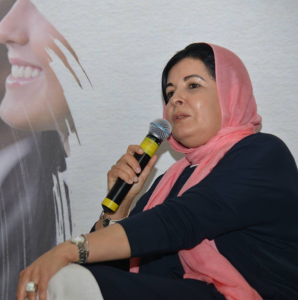
Having read the Qur’an, I cannot imagine Muhammad approving of the Feast of Herod, as described in Chapter 14 of the Gospel of St. Matthew in the Christian bible. Not apropos that particular event, it is written in the Qur’an: “O believers, draw not near to prayer when you are drunken,” and the guests almost certainly were. Probably, anyway. John the Baptist, says the Gospel, had told Herod Antipas that he could not have the Princess Herodias in his bed (which is what he wanted) because she was married to Herod’s brother, Philip. Her daughter, Salome, however, was ordered to dance to entertain those enjoying the party and Herod promised to give her whatever she asked for if she pleased the crowd. Goaded by her mother (clearly a rather unpleasant woman, if apparently quite sexy) she pleased the guests immeasurably and so she asked for the head of John the Baptist on a plate. It was at best a very odd choice, but Herod had to keep his promise, if with great reluctance. I suppose if you’re going to have your head cut off, it’s some slight compensation to know that the man ordering it didn’t want to. We don’t know what sort of dance Salome did, but it probably wasn’t a waltz, a rumba or a pole dance. In any case, it very much pleased the guests, it seems, who’d been drinking heavily, one assumes. It wasn’t until Oscar Wilde’s play in 1891 that it turned into the Dance of the Seven Veils, an early form of striptease, the veils coming off one by one. It probably wasn’t the first time (and it certainly wasn’t the last) that a man lost his head over the sight of a woman’s naked body. In fact, it wasn’t just a case of Oscar Wilde fantasizing: to the French she had come to symbolize, in the words of the French novelist Charles-Marie-Georges Huysmans, “the symbolic incarnation of undying lust”. She sounds like the sort of young woman who’d always be welcome at any party. Wilde had also been influenced by Gustave Flaubert, whose story about Salome has her dancing on her hands, presumably upside-down, which may conjure up an interesting vision in the male imagination.
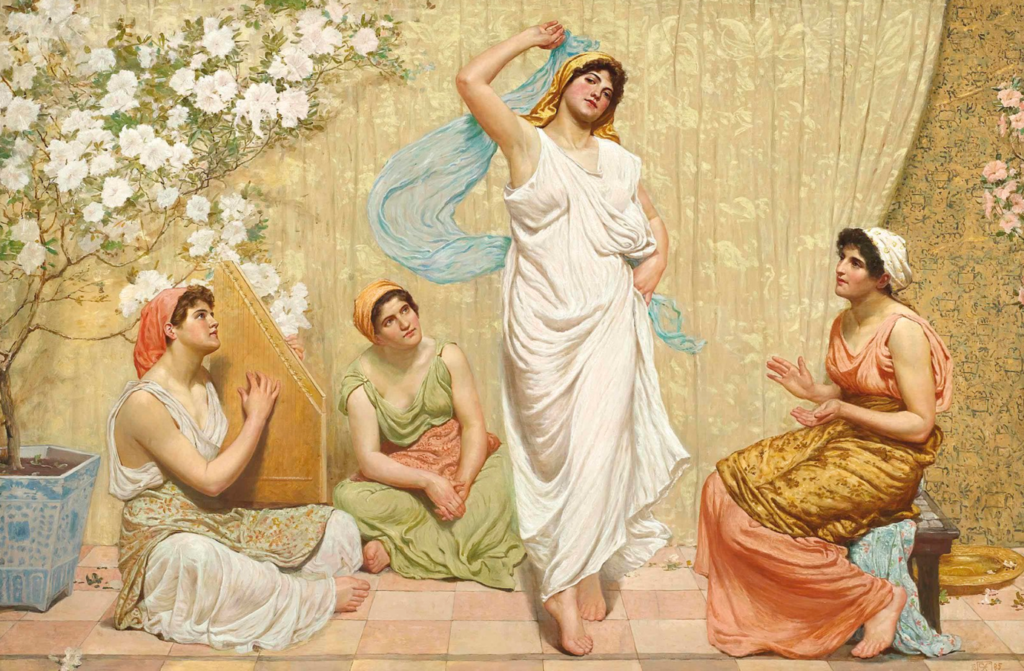
There are a number of versions of the story, but all of them suggest Salome was a very sexy lady who liked to show more than was considered proper at the time as a form of entertainment. Sex never goes out of fashion, after all. Nor, it seems, does exotic dancing. But if you think about the circumstances described in St. Matthew’s Gospel, Salome must have been very young.
| NEVER FORGET THE WOMEN
You would not know it from the utterances of the Taliban but Muhammad wrote a lot about women’s behaviour, none of it requiring them to cover themselves from head to foot and not to carry out any sort of work. The Taliban’s interpretation of how women should behave and be treated is a world away from what is written in the Qur’an. It places an obligation on women to ensure their menfolk are obedient to the Faith. “If a woman fear rebelliousness or aversion in her husband, there is no fault in them if the couple set things right between them; right settlement is better; and souls are very prone to avarice.” The Qur’an seems to assume that men will have the leading rôle but does not authorise the mistreatment of women. “You will not be able to be equitable between your wives, be you ever so eager; yet do not be altogether partial so that you leave her as it were suspended.” Wise words, although I’m not keen on the idea of one man having several wives (and several mothers-in-law).
When I was in Afghanistan, I observed, of course, that men and women were regarded very differently. The Mujahideen lived in a tented community, not far from the border with Pakistan. I noted that the men of the family would emerge into the open first, with the women following meekly behind. But one of the men came to our small group because his daughter had a bad headache and he needed help. One of my colleagues, a very kind Frenchman, found her some painkillers – paracetamol and aspirin, I think – and got a wonderful smile of gratitude from the young woman for his kindness. Much of the kow-towing to men seemed to be more for show than from deeply-held beliefs.
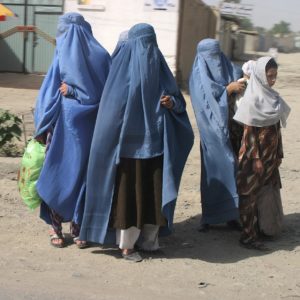
Those who see Muslim women as prisoners and those who see them as truly liberated – if not in the way it might be done in the West – still face the same intractable problems. “Between these two diametrically opposed visions,” writes Lamrabet, “the Muslim woman ultimately remains a prisoner, despite herself, of a discourse which in both cases, ignores her person, her aspirations and her will…Between a frozen Islamic thought which assiduously ring-fences women’s issues and a Western ideology which takes pleasure from denigrating Islam through those same issues, one struggles to think of a third way, through which Muslim women can emerge from this ideological impasse.”
In the case of the Taliban, however, women have no rights at all. The leaders didn’t get that idea from the Qur’an: nowhere does it describe woman as sub-human creatures who exist only to be abused. In their latest bout of needless cruelty, they have ordered the closure of all beauty salons. The ruling comes from the Taliban’s Ministry of Vice and Virtue, which could be renamed “the Ministry of Cruelty and Blind Stupidity”. The excuse, given by Afghanistan’s Supreme Leader, is that their existence puts economic pressure on bridegrooms and their families, who are expected to fund the beauty treatments prior to matrimony. On the doors of the closed salons, which showed posters with pictures of the treatments available (albeit not anymore) the women’s faces have been painted over on the orders of the Taliban. One is left to conclude that the Taliban fear that women are cleverer than them (which wouldn’t be hard) and so are clamping down to prevent the danger that their intelligence might otherwise threaten the ruling positions of the Taliban themselves.


That fear of being overtaken by woman must run very deep. There is absolutely nothing in the Qur’an to support the Taliban’s pointless misogyny: “Misogyny is hatred of, contempt for, or prejudice against women. It is a form of sexism that is used to keep women at a lower social status than men, thus maintaining the social roles of patriarchy. Misogyny has been widely practised for thousands of years.” And it has always been wicked, pointless and evil.
The ludicrously titled “Vice and Virtue ministry” announced that the beauty salons used fake hair and shaped women’s eyebrows, which a ministry spokesman said is “prohibited in Islam”. No, it isn’t. I’ve read the Qur’an and I don’t recall a single mention of eyebrows. An even more ludicrous excuse given was that the over-use of make-up could prevent women’s skin from absorbing water during Islamic prayer rituals. So buy some cream! These claims are so thoroughly stupid that one might be inclined to laugh at them, but under the brutal rule of the Taliban, you probably wouldn’t dare. They’re a very cruel (dare I say “ungodly”?) bunch. There are any number of other restrictions imposed since the Taliban took power in August 2021. The new rules were not for the benefit of Afghanistan’s citizens, since it removed one of the very few sources of income an Afghan woman could have. The Taliban have closed off every other source of earning a livelihood. Women have described life in Afghanistan as meaning that they are obliged to exist in “prison-like” conditions. The United Nations Human Rights Council give examples of what they call “grave, systematic and institutionalised discrimination against women and girls, which, they say, “is at the heart of Taliban ideology and rule”. For that to be true, however, the Taliban would have to actually have hearts. Clearly they don’t. One analysis accuses the Taliban of trying to erase women altogether from public life.
In a statement, Nada Al-Nashif, the UN’s Deputy High Commissioner for Human Rights said: “Over the past 22 months, every aspect of women’s and girls’ lives has been restricted. They are discriminated against in every way.” The UN went further in a recent report. Women have been banned from further education by a government that seems to fear that women are cleverer than men, if less violent. After initially segregating the genders, women are no longer allowed to study. It means the end of the road for the roughly 90,000 women who were on university courses in 2018 when the Taliban decided to turn back time to the middle ages or earlier.

The Taliban’s excuse this time was, they claimed, because too many female students “hadn’t worn appropriate Islamic attire, such as a hijab, and there had been a mixing of genders”. What a surprise, at a university. Clearly, the Taliban, who would appear to be poorly educated, have never heard of, say, Katherine Johnson, a leading mathematician at NASA, or Tiera Guinn, who is a rocket scientist. They probably don’t know about Mare Curie, either, the Polish born genius who became head of the physics lab at the Sorbonne University. There was Jane Goodall, who became famous for her work with primates. I could go on and on, but I suspect the Taliban neither know nor care about the advancement of science. After all, the Taliban have excluded women from the jobs market and banned women from working with the United Nations.
| STUPID RULES IMPOSED BY STUPID PEOPLE?
The sheer crass stupidity of the Taliban and its leadership is hard to comprehend. Women have also been banned from working with non-governmental organisations such as “Save the Children”, the “Norwegian Refugee Council” and others, forcing them to close down any humanitarian missions they were running in Afghanistan. The effect of this silly gender manipulation is extremely negative, according to UN Spokesperson Stephane Dujarric, who said it was hard to imagine how Afghanistan would deal with the many challenges it faces without the active participation of women and the education they can provide. The Taliban’s new rules are, quite frankly, beyond stupid. Yamini Mishra, Regional Director for Amnesty International’s South Asia office said that barring women from working for humanitarian NGOs was extremely unwise. “It is as if the Taliban are intentionally driving the country into famine.” But it gets worse. “Their discriminatory policies are bringing shocking levels of food insecurity and making the delivery of international assistance almost impossible.” Furthermore, women in need of assistance are only allowed to accept it from other women. They are forbidden to have contact with men who are strangers to them. If the Taliban really believe that men brought into contact with women they don’t know will immediately engage in sexual activity they must have a very poor opinion of their own self-control!
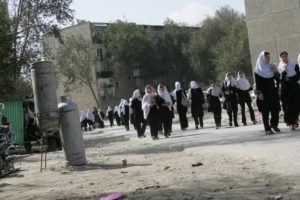

In the light of all this, you may not be surprised to learn that Afghanistan is one of the most dangerous countries in the world for women, and also for mothers and babies. Every year some 70 out of every 1,000 pregnant women die during pregnancy or while giving birth. Even if they successfully bring a baby into the world, it’s a serious struggle to feed their young, often because they do not have enough to eat to produce the milk their babies need. The humanitarian organisation, Doctors Without Borders, has said that excluding women from higher education and banning them from working at aid organisations has seriously impacted on access to medical care. Women cannot even reach medical assistance that is not on their doorstep because of the travel restrictions the Taliban have imposed.
There is a problem here, because it appears that the Qur’an gives men the right to beat their wives, although the severity of the beating is not clear. The verse in question, An-Nisa, 4:34, instructs men to look after women, but permits “correction” if the women overstep the mark. The verse says (although this depends on the translation): “As for those women whose ill-will you have reason to fear, admonish them first; then leave them alone in bed; then beat them.” Translations vary and the word used about the offense, nushuz, represents a condition of considerable conflict between man and wife, although it is most often translated as insubordination still, some translate it as “adultery”. An alternative translation takes a softer approach: “And if you sense ill-conduct from your women, advise them first, but if they persist, do not share their beds, but if they still persist, then discipline them gently. But if they change their ways, do not be unjust to them.” So, no instruction regarding a beating in this case, which seems fairer to me, since men are normally stronger than women (OK, not always).
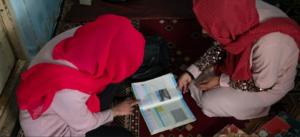
It’s no wonder some Muslims find it confusing. According to Asma Lamrabet’s book, Women in the Qur’an, the issue should ideally develop in three stages: firstly with an attempt at reconciliation through talking to each other; secondly by the man refraining from touching his wife in the marital bed, supposedly as a means of coercion. If that doesn’t work, the third phase is fa-dribuhunna, which translates as “beat her” or just “correct her”. However, the Prophet was well-known for having an aversion to all forms of violence, especially against women. He reacted to this suggestion of violence by giving women the right to Qiṣāṣ, which basically means “an eye for an eye”. In other words, if he is violent towards you, respond in kind and thump him, too. It was a revolutionary idea at the time and even today is regarded as “unthinkable “, although I can’t see why. Many commentators argue that it is simply a way of bringing equality to the household. Certainly, it came as a bit of a shock to, for instance, a Bedouin tribal society. My advice, however, would be not to try to apply that rule to the Taliban, who might very well cut your hand off if you raise it against one of them.
During his life on Earth, many women came to see the Prophet, often about the mistreatment they received from their husbands. Given his surprising response, it seems unlikely that Mohammad would endorse the recommendations of the Taliban in daily life. In fact (and perhaps not surprisingly) a large number of men approached him, claiming that his recommendation would incite women to rebel against their husbands. It seems likely that it was intended to encourage equality of treatment for both men and women. According to Lamrabet, “The Qur’anic vision of the institution of marriage is a vision based on love, compassion and mutual help.” While the Qur’an appears to endorse the idea that a woman who rebels against her husband (and/or commits adultery, depending on the translation) can be beaten, it seems somewhat ambivalent as to how fiercely the concomitant beating can be administered.
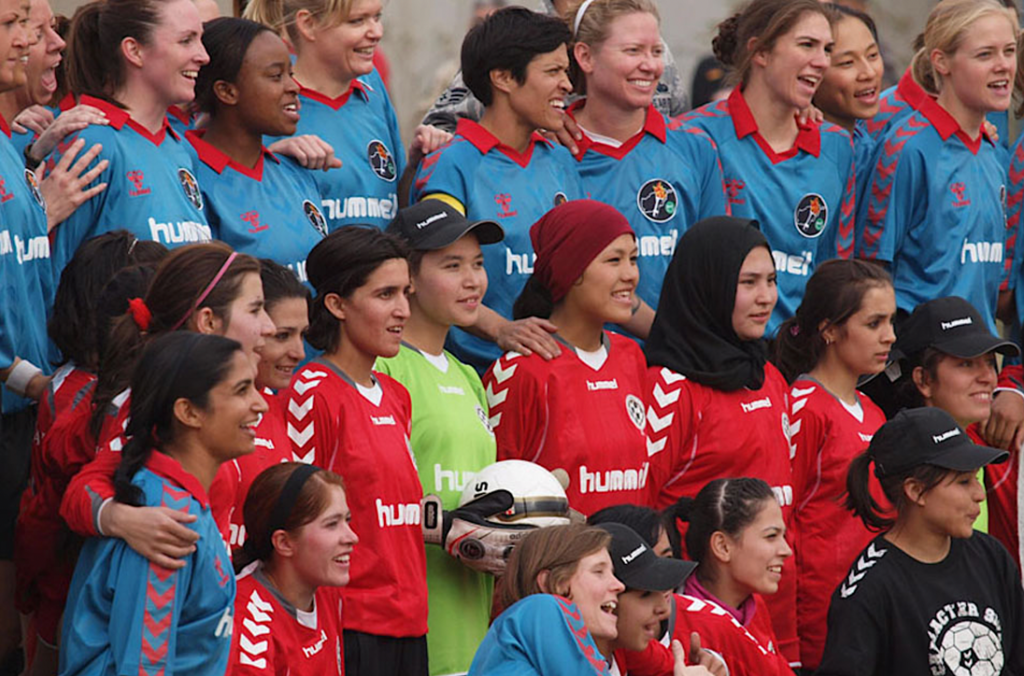
| AN EYE FOR AN EYE?
In case you’re wondering how Afghanistan’s women’s teams can compete in international competitions, they have to live in exile in Australia. The Taliban’s ludicrous edict forbids women in Afghanistan from visiting parks, fitness facilities, public pools, gymnasia, or sports clubs. They are not allowed to play football, no matter what they’re wearing. In other words, Afghan women are not allowed to compete anywhere. Additionally, whether at home or wherever else they may find themselves, Afghan women are obliged to wear a burqa, which covers virtually the entire body. If they do not, their male relatives will face jail sentences. And, of course, females who enjoy sports are not permitted to compete. The rules are, of course, completely ridiculous; Afghan women cannot travel to see a doctor (and there are very few female doctors anyway) without being accompanied by a “mahram” – a father, husband or brother to play the part of chaperone. Needless to say, females can only receive treatment from female doctors, of which there is a severe shortage. Of those who actually exist, they, too, must abide by the same ridiculous restrictions, so of the very few female doctors Afghanistan has, most are obliged to stay at home virtually all the time. How this helps their mortal souls is quite beyond the comprehension of any rational person. The same applies to midwives. The Taliban’s decision to exclude women from higher education and to impose restrictions on travel is quite exceptionally cruel and absolutely pointless and stupid.

It seems clear that the Taliban want to exclude women from education, work, travel, medical assistance or an ability to lead a normal life of any kind. The cruelty of the Taliban is exceptional and utterly pointless. Indeed, it defies logic. The Qur’an is not like that, even if it sometimes seems to be ambivalent. According to Lamrabet, it was never intended that women should effectively disappear from everyday life. If they do, then humankind is at an end. Lamrabet stresses repeatedly that Muslims must participate (the Qur’an does not exclude women from this obligation) in order to speak up for their faith. It is an obligation placed upon them, but one that the Taliban think should be ignored, which makes no sense. As Lamrabet writes: “It is clear in the higher objectives of the Qur’anic vision, called maqasid as-Shari’ah, this determination to include women at all levels of social participation.” If the Taliban force the Afghans to ignore this order from their God, then surely what awaits them is Gehenna, another word for Hell. See you there, guys, but don’t forget the cream against burns.
henry.carruthers@europe-diplomatic.eu

